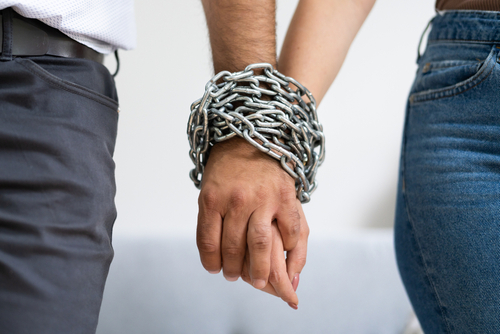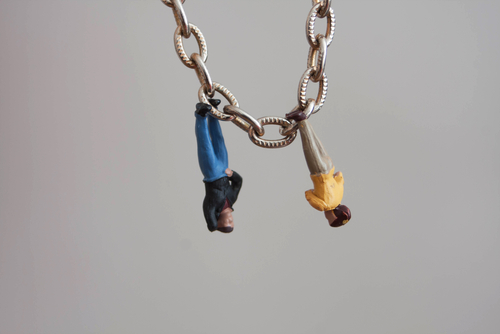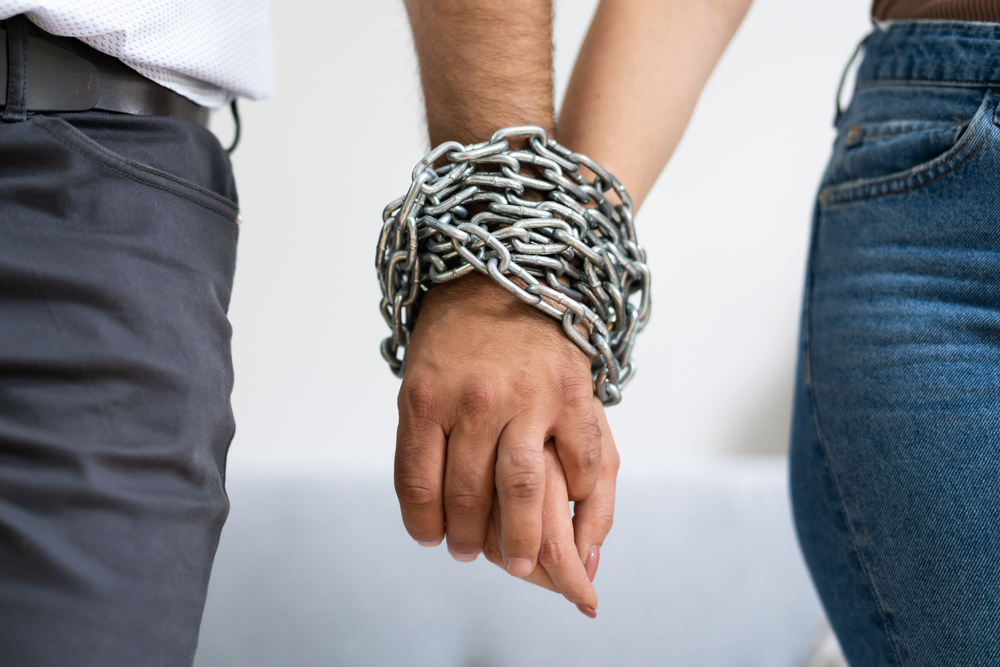The realm of human relationships is vast and intricate, despite all the psychological knowledge and development happening today.
One of these phenomenons is codependency, a multifaceted and often misunderstood behavioral pattern characterized by excessive reliance on others for emotional and psychological needs, often to the detriment of one’s own well-being.
This idea gained significant attention from scientific communities worldwide as an issue that, surprisingly, managed to avoid detection by psychologists for a long time. However, now that we know it exists and that it’s observable, a whole host of other questions arises.
The biggest among said conundrums is “How does codependency start?” Is it a simple matter of being “born that way” or are there underlying mechanisms that drive a person to develop this highly autodestructive behavioral pattern?
The truth is that it is a combination of both. This is why understanding the origins and predispositions of codependency requires a comprehensive exploration of various factors, including genetics, family dynamics, personal experiences, and many others.
Are Codependents Born Or Made?
The answer to this question is an intricate and nuanced one, and it has long been a subject of debate, mainly because it cannot be defined either as nature or nurture but, rather, as a complex interplay between the two.
Genetic Predisposition
There is evidence to suggest that there may be a genetic component to codependency. Some research indicates that certain genetic factors can contribute to a person’s predisposition for codependent behaviors.
For example, temperament and personality traits, most notably high levels of empathy, a strong desire for connection, and a tendency to prioritize others’ needs (“caregiving”), can make a person more susceptible to developing codependency.
Even so, it is crucial to note that genetics alone do not determine whether someone will succumb to this behavior or not. Environmental factors are a major contributor to the development of codependency as well.
Environmental Factors
Early life experiences, particularly within the family environment, can profoundly impact an individual’s perception of relationships as a whole, as well as their image of themselves. What this means is that dysfunctional family dynamics, emotional neglect, or experiencing trauma during childhood can contribute to the development of codependency later in life.
After all, the family is the primary socializing agent. It shapes an individual’s beliefs, world views, values, and patterns of relating to others. Therefore, growing up in an environment where one or both parents exhibit codependent behaviors can (and often do) influence a child’s perception of relationships and their role within them.
In this instance, a child may learn that their worth is dependent on meeting the needs of others. Alternatively or simultaneously, they may develop a heightened sense of responsibility for the emotions and actions of those around them. Either way, these learned behaviors and beliefs can represent a baseline for codependency formation in adulthood.
Psychological Factors
The final big contributor that impacts not only why, but also how codependency is created is a person’s own psychological profile. Characteristics such as low self-esteem, poor self-worth, and a fear of abandonment can set an ideal baseline for a variety of behavioral issues.
For instance, individuals with low self-esteem may seek external validation in an attempt to derive their self-worth by meeting the needs of others. Similarly, the fear of abandonment may drive them to adopt codependent behaviors as a means of ensuring connection at all costs.
However, this cost is often too great, regardless of standpoints or reasons behind it as it drives the codependent to define themselves through others, rendering them passive to their own needs and hindering their growth.

Who Is Most Likely To Be Codependent?
Codependency does not discriminate based on gender, age, or social background. It can affect individuals from all spheres and walks of life. However, certain factors may increase one’s susceptibility to these behavioral patterns.
As mentioned above, an insecure individual’s reliance on external sources for self-esteem and self-worth can fuel codependent tendencies, as they may feel the need to constantly please others in order to receive any sort of validation.
Another high-risk group is caregivers and empaths. People who have a natural inclination towards caregiving or possess highly empathetic traits may be more prone to developing codependent habits. Their innate desire to help and support others can lead to an imbalance in relationships, where their own needs are consistently neglected.
When Did Codependency Begin?
Codependency is not an innate trait that one is born with. Rather, it is a learned pattern of behavior with its actual onset in an individual’s life varying based on their unique life experiences and circumstances.
That said, a person can become codependent at any stage of their life, from early childhood to well into adulthood:
- Childhood is the period where people are most vulnerable to negative behavioral patterns due to high dependence on others for physical and emotional needs. As such, a child who grows up in an environment where these needs are consistently unmet or they’re forced to take on caregiving roles beyond their age (or comprehension) may begin exhibiting codependent behaviors at an early stage of life.
- Adolescence is a crucial period for identity formation and the development of interpersonal relationships. During this stage, individuals seek validation, belonging, and acceptance from their peers and romantic partners. If an adolescent lacks a strong sense of self or struggles with low self-esteem, they may be more susceptible to adopting codependent tendencies as they seek external sources of validation and define their worth based on others’ opinions.
- Early adulthood is often marked by the pursuit of romantic relationships and the establishment of independent lives outside the family unit. For individuals who have experienced childhood trauma, emotional wounds, or a history of unhealthy family dynamics, a passive codependent may (re)surface within romantic relationships as their desire for love, security, and acceptance can lead them to prioritize their partners’ needs at the expense of their own.
- Significant life transitions and challenges can intensify and sometimes define harmful behavioral patterns. Events such as marriage, parenthood, career changes, or the illness of a loved one can trigger codependent behaviors as individuals face increased stress, responsibilities, and uncertainties. These transitions may exacerbate the tendency to prioritize other people’s needs and neglect self-care as a means of coping with the demands of the situation.
How Does Codependency Start?
Codependency often develops gradually, stemming from a combination of personal experiences, learned behaviors, and societal influences. Some of the most common triggers are:
- Early life experiences: Growing up in an environment characterized by emotional neglect, abuse, or inconsistent caregiving can shape one’s beliefs about relationships and self-worth. These early experiences can lay the groundwork for seeking validation and approval from others, leading to the onset of codependency in adulthood.
- Trauma and emotional wounds: Distressing experiences can disrupt one’s sense of self and create a heightened need for security and connection. In this instance, codependency may emerge as a coping mechanism to alleviate the pain and fill the void left by unresolved trauma.
- Societal and cultural norms: Messages that emphasize self-sacrifice, putting others’ needs before our own, or the notion that one’s worth is defined by their ability to care for others can reinforce codependent patterns.

“Codependent” Does Not Have To Define You – Help Is Within Reach With Pivot
Don’t remain trapped in codependent patterns that drain your energy and keep you from personal growth. PIVOT is here to help you take a proactive step toward recovery and liberation.
At our Glass House retreat, you’ll embark on an empowering journey of self-discovery and healing, surrounded by support and compassion. Our expert coaches will provide personalized guidance and therapeutic interventions tailored to your specific needs.
Get in touch with us today and let us help you gain deep insights into the root causes of codependency and develop practical tools to overcome it so you can live a healthy, fulfilling life.



















